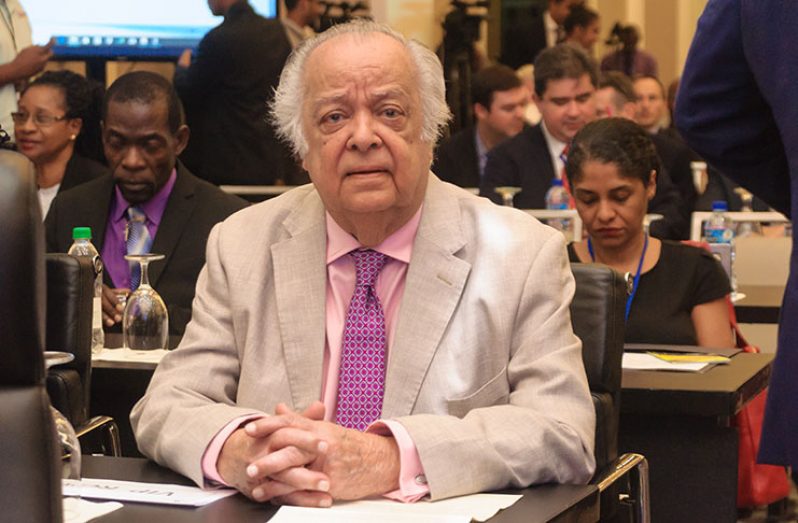— on Guyana-Venezuela border controversy, says Sir Shridath
DISTINGUISHED Guyanese diplomat Sir Shridath Ramphal has said that the final judgment handed down by the International Court of Justice (ICJ) in the Guyana/Venezuela territorial controversy will be binding.
The long-standing territorial controversy between the two South American countries was referred to the ICJ at the end of January by the United Nations Secretary-General Antonio Guterres, effectively bringing an end to the Good Offices process. Since 1962, Venezuela has been contending that the 1899 Arbitral Award, with which it had agreed, is null and void.
Speaking to reporters on the matter on the margins of the Guyana International Petroleum Business Summit (GIPEX) at the Guyana Marriott on Wednesday, Sir Shridath, who was present at the signing of the Geneva Agreement on February 17, 1966, said Guyana will be moving to the ICJ to have the age-old controversy settled.
The World Court’s decision, he said, will be obligatory in nature, while making it clear that it will not be simply an opinion as suggested by some political analysts here.
“The decision of the court will be binding… it is not going to be in an advisory capacity…. Unfortunately, some pretty wild things have been said in Guyana which are far from legally accurate,” Sir Shridath said.
It was explained that the ICJ’s ruling will be made under the 1966 Geneva Agreement and Article 33 of the Charter of the United Nations. It was under the Geneva Agreement that Guyana and Venezuela had conferred upon the UN Secretary-General the power and responsibility to choose a means of peaceful settlement from amongst those contemplated in Article 33 of the Charter.
The distinguished Guyanese diplomat is urging his fellow Guyanese not to be misled.
WILD OPINIONS
“Don’t be misguided by these wild opinions. This is not a time for Guyana to argue these issues in Guyana with Guyana,” he said.
In moving forward, Sir Shridath said it is important that the country approaches the matter with some degree of caution and professionalism.
“I think that it is very important that we are modest, we are not celebratory, [and] we are not triumphalist. We are going to be modest, serious, and professional and move forward.”
The Guyana Government has disclosed that US$15M has been set aside for legal fees. Legal expenses, Sir Shridath said, is necessary for the process, but pointed to the fact that a lot is at stake.
“If you go to the court there must be some legal expense, but what is at stake for Guyana is everything, so legal expenses are minuscule to what is at stake and what I think we are likely to do is reassemble the team that was successful in [the] Suriname [matter] and this is not about discussing those details, but they will be released in due course,” he told reporters.
Foley Hoag was the law firm that successfully spearheaded the case for the Government of Guyana in the maritime boundary dispute with Suriname.
UNWISE
However, he warned that once the controversy engages the attention of the World Court, it would be unwise for political leaders and/or the legal team to discuss the matter in public.
“As Guyanese you must not expect the political leadership or the legal team to engage in public conversations when in court. You don’t as lawyers when you are in court talk at the same time to the press,” Sir Shridath said, while urging that Guyanese be understanding of the situation.
Asked how long it could take before a ruling is handed down by the ICJ, Sir Shridath, while positing that it is a difficult question to answer, said, in part, it depends on the actions of Venezuela.
“It can depend on what Venezuela ultimately does, that can determine the length of the entire character of the proceedings … if it’s a full-time hearing, it could be longer, but you are talking about a matter of years,” he explained.
The Government of Venezuela, in a public statement, rejected the UN Secretary- General’s decision, stating that it remains firm its historic position – that the matter be resolved at the level of the Good Offices. But Mr. Guterres, in making his decision, concluded that no significant progress had been made at the level of the Good Offices process.
Meanwhile, Foreign Affairs Minister Carl Greenidge and Minister of State Joseph Harmon have confirmed that on Tuesday, Cabinet received a report from the Foreign Affairs Ministry on the border controversy.
“We are very happy with the conduct of the negotiations so far on behalf of Guyana; and we are looking forward to good results when the matter goes to the ICJ,” Minister Harmon told reporters on Wednesday.
On Monday, Minister Greenidge had noted that his ministry with support from its team of advisors and lawyers would present Cabinet with broad options to consider in the form of a report.












